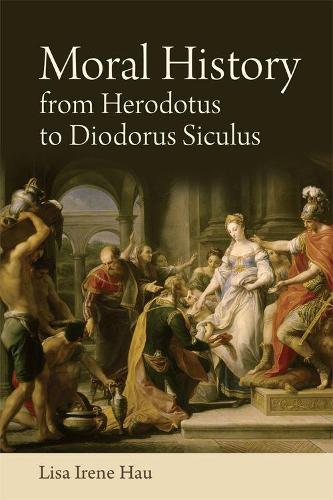
Moral History from Herodotus to Diodorus Siculus
(Paperback)
Publishing Details
Moral History from Herodotus to Diodorus Siculus
By (Author) Lisa Irene Hau
Edinburgh University Press
Edinburgh University Press
8th November 2017
United Kingdom
Classifications
Tertiary Education
Non Fiction
European history
Historiography
Literary studies: ancient, classical and medieval
880
Physical Properties
Paperback
320
Width 156mm, Height 234mm
Description
Why did human beings first begin to write history Lisa Irene Hau argues that a driving force among Greek historians was the desire to use the past to teach lessons about the present and for the future. She uncovers the moral messages of the ancient Greek writers of history and the techniques they used to bring them across. Hau also shows how moral didacticism was an integral part of the writing of history from its inception in the 5th century BC, how it developed over the next 500 years in parallel with the development of historiography as a genre and how the moral messages on display remained surprisingly stable across this period.
For the ancient Greek historiographers, moral didacticism was a way of making sense of the past and making it relevant to the present; but this does not mean that they falsified events: truth and morality were compatible and synergistic ends.
Reviews
The bibliography, the place index, and the general index (p. 278-312) round off the book, which is also designed in a graphically appealing manner. Overall, Hau's comprehensive work provides thought-provoking and interesting suggestions. (Translated from the German) -- Carlo Scardino, Heinrich-Heine-Universitt Dsseldorf * Bryn Mawr Classical Review *
The bibliography, the place index, and the general index (p. 278-312) round off the book, which is also designed in a graphically appealing manner. Overall, Hau's comprehensive work provides thought-provoking and interesting suggestions. (Translated from the German) -- Carlo Scardino, Heinrich-Heine-Universitt Dsseldorf * Bryn Mawr Classical Review *
Hau deploys the overt moralising of the Hellenistic historians to illuminate the more implicit and thought-provoking moralising of their Classical forebears. Among other questions she asks: does moral didacticism make for bad historiography Was it simply a lens for viewing events, or could it drive wholesale invention * Emily Baragwanath, The University of North Carolina *
This volume, from which I personally have learned a great deal, is a tremendous achievement and can be recommended to all readers. To conclude, it must be reiterated that the author demonstrates a wonderful grasp of ancient Greek historiography as a whole and an astonishing knowledge of the modern scholarship. This very coherent book would and will form an excellent introduction to ancient Greek historiography for any graduate student, in particular as it offers a complete bibliography for further research. -- Edith Foster, University of Queensland * Histos *
This volume, from which I personally have learned a great deal, is a tremendous achievement and can be recommended to all readers... To conclude, it must be reiterated that the author demonstrates a wonderful grasp of ancient Greek historiography as a whole and an astonishing knowledge of the modern scholarship. This very coherent book would and will form an excellent introduction to ancient Greek historiography for any graduate student, in particular as it offers a complete bibliography for further research. -- Edith Foster, University of Queensland * Histos *
It has become a commonplace in modern scholarship to view the moral and didactic aims of the ancient Greek historiographers as something entirely separate from, and generally detrimental to, the value of their works as history. In this groundbreaking book, Hau seeks to challenge this pervasive assumption. She argues that it is only by taking the moralizing impulse in ancient historiography seriously as a way to shape the events of the past into the narrative form that is the most useful and relevant to their intended readers that we can reach a full understanding of what the ancient Greek historiographers were actually trying to achieve... As Hau convincingly concludes: (1) moral didacticism and historical explanation are not mutually exclusive, (2) moralizing was not limited to those historians generally perceived as inferior (such as Xenophon or the Hellenistic historians) but was a fundamental component of ancient historiography from its very beginning and (3) the moral basis of ancient historiography does not make it bad history but instead allows it to teach its readers valuable universal truths. -- Frances Powell, University of Alberta * Journal of Hellenistic Studies *
Moral History from Herodotus to Diodorus Siculus shows the invigorating power of history for both ethical and political life. Haus novel, lucid, and cogent arguments should inspire students of ancient political thought to widen their consideration of ancient history even as it invigorates their moral lives towards nobler exempla Haus trove of discoveries about the techniques and strategies of these moral historians should hasten even more work on the implications of these lessons for social and political life. Moral History from Herodotus to Diodorus Siculus is certainly invigorating. -- Joel Alden Schlosser, Bryn Mawr College * POLIS, The Journal for Ancient Greek Political Thought *
Author Bio
Lisa Irene Hau is Senior Lecturer in Classics at the University of Glasgow. She holds a PhD from Royal Holloway, University of London, and studied for her first two degrees at the University of Aarhus, Denmark. She is the author of Moral History from Herodotus to Diodorus Siculus (EUP 2016) and co-editor of Diodoros of Sicily. Historiographical Theory and Practice in the Bibliotheke, (Peeters 2018) and Truth and History in the Ancient World. Pluralising the Past (Routledge 2016). She has also published articles on numerous topics related to ancient historiography. In 2017-18 she held an Alexander von Humboldt Research Fellowship for experienced researchers at the University of Heidelberg.
